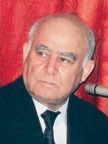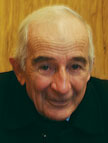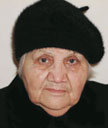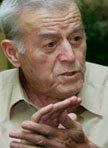|

Winter 2005 (13.4)
 Contributors Contributors
 |
In December 2005,
the National Archives of Azerbaijan celebrated its 85th Jubilee.
This invaluable treasury of historical documents was originally
established by decree of Nariman Narimanov when the Bolsheviks
took power in Azerbaijan. Here Archives Director Atakhan Pashayev
describes the controversy that surrounds Narimanov, who, in 1925,
became among the first of Stalin's assistants to die. Page
36. The Archives Jubilee coincided with the publication of
our 50th issue so Editor Betty Blair presented an entire set
of the magazines-nearly 5,000 pages of text in English - in deepest
appreciation for all their support since 1993. |
 |
Gulhusein Huseinoghlu, 82, was released from the Gulag half
a century ago. For years, he's been promising friends and family
that he's going write his own memoirs. What a rare contribution
to Azerbaijan's history it would be. Gulhusein's mind is extremely
sharp and active, and the distance of years has given him as
a professional writer a remarkable perspective on this dark period
of Soviet history. When we started working on this issue, Gulhusein
had stopped giving interviews to journalists. Fortunately, Fatma
Alasgarova (below) convinced him to meet with us. Her late husband
Azer had been exiled along with him. Page
52. |
 |
Fatma Alasgarova had only been married four months when
her husband Azer, 22, was arrested and sentenced to 25 years
in exile. Like many other women in similar circumstances, she
was pressured by her family to divorce and move on with her life.
Confused and depressed, she eventually gave in to her family.
Fortunately, Azer survived the Gulag. When Stalin died, Azer's
term was shortened. In 1955, he returned to Baku after only seven
years' imprisonment. Realizing that they still loved each other,
Azer and Fatma remarried. Fatma confesses: "I'm so proud
to have been Azer's wife. He was a man who stood up for what
he believed, despite the tremendous cost". Page
58. |
 |
Fuad Mustafayev was only 13 years old when Stalin crushed
his older brother Chingiz, 19, and "wanna-be" activist
friends. Fuad, now 75, has carried on his brother's legacy by
raising three sons, who are all involved in media: Seyfulla and
Vahid direct ANS Group-television, radio and print. Son Chingiz
was killed filming the Karabakh war in 1992. The first Chingiz
so desperately wanted to know what was going on in the world
by listening to short-wave radio; the next generation of Mustafayevs
have totally committed their lives to providing alternative news
sources; breaking the latest news in Azerbaijan. Page
68. |
 |
Aydin Vahidov was only 23 when arrested as a member
of a group that had disbanded four years earlier. Today, only
he and Gulhusein remain from those original seven members. Aydin
was lucky to use his training as an engineer in the Gulag. His
interview here is marked by a quiet optimism, intent on finding
goodness even in the midst of hell. Aydin graciously assented
to this interview even though he could barely raise his voice
above a whisper from his bed. He says: "Our people should
know that there were people who fought for the independence of
our Republic-for their independence. We always knew that Azerbaijan
would be independent one day." Page
64. |
Back to Index AI 13.4 (Winter
2005)
AI Home
| Search | Magazine
Choice
| Topics
| AI Store | Contact us
Other Web sites
created by Azerbaijan International
AZgallery.org | AZERI.org | HAJIBEYOV.com
|